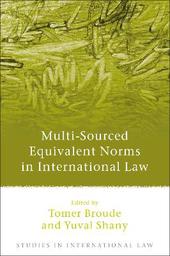
|
Multi-Sourced Equivalent Norms in International Law
Hardback
Main Details
| Title |
Multi-Sourced Equivalent Norms in International Law
|
| Authors and Contributors |
Edited by Tomer Broude
|
|
Edited by Professor Yuval Shany
|
| Series | Studies in International Law |
|---|
| Physical Properties |
| Format:Hardback | | Pages:344 | | Dimensions(mm): Height 234,Width 156 |
|
| ISBN/Barcode |
9781849461450
|
| Classifications | Dewey:341.04 |
|---|
| Audience | | Professional & Vocational | | Tertiary Education (US: College) | |
|---|
|
Publishing Details |
| Publisher |
Bloomsbury Publishing PLC
|
| Imprint |
Hart Publishing
|
| Publication Date |
21 March 2011 |
| Publication Country |
United Kingdom
|
Description
Recent decades have witnessed an impressive process of normative development in international law. Numerous new treaties have been concluded, at global and regional levels, establishing far-reaching international legal and regulatory regimes in important areas such as human rights, international trade, environmental protection, criminal law, intellectual property, and more. New political and judicial institutions have been established to develop, apply and adjudicate these rules. This trend has been accompanied by the growing consolidation of treaty norms into international custom, and increased references to international law in domestic settings. As a result of these developments, international relations have now reached an unprecedented level of normative density and intensity, but they have also given rise to the phenomenon of 'fragmentation'. The debate over the fragmentation of international law has largely focused on conflicts: conflicts of norms and conflicts of authority. However, the same developments that have given rise to greater conflict and contradiction in international law, have also produced a growing amount of normative equivalence between rules in different fields of international law. New treaty rules often echo existing international customary norms. Regional arrangements reinforce undertakings that already exist at the global level; and common concerns and solutions appear in many international legal fields. This book focuses on such instances of normative parallelism, developing the concept of 'multisourced equivalent norms' in international law, with contributions by leading international law experts exploring the legal and political implications of the concept in a variety of contexts that span the full spectrum of international legal norms and institutions. By concentrating on situations governed by a multitude of similar norms, the book emphasizes the importance of legal contexts and institutional settings to international law-interpretation and application.
Author Biography
Tomer Broude is the Sylvan M. Cohen Chair in Law at the Faculty of Law and Department of International Relations, and the Academic Director of the Minerva Center for Human Rights at the Hebrew University of Jerusalem. Yuval Shany is the Hersch Lauterpacht Chair in Public International Law at the Faculty of Law of the Hebrew University of Jerusalem and a director in the Project on International Courts and Tribunals.
ReviewsMulti-Sourced Equivalent Norms in International Law is a breath of fresh air. The general theme of this collection of essays represents a fairly different take on normative heterogeneity in international law. This impressive volume is likely to inspire future research on various aspects of the MSEN phenomenon, thereby marking itself out as a significant contribution to contemporary international law scholarship. -- Jolene Lin * Transnational Legal Theory, 2(4) * Shany and Broude assembled this commendable volume round a powerful intuition. The lack of homogeneity of the chapters and the authors' reluctance to prescribe universal solutions are due to the difficulties relating to the novelty of the terminology and are nevertheless outmatched by the virtues of this book. It is a path-breaking study and certainly will be amply referred to in the future: MSENs provide a fresh focus for fragmentation studies, as they divert scholars' attention from the few examples of egregious friction between systems to the much more feasible study of the systemic day-to-day adjustments occurring round 'similar' obligations. It seems obvious now, but it was not the case before this book was published. -- Filippo Fontanelli * Global Law Books.org *
|